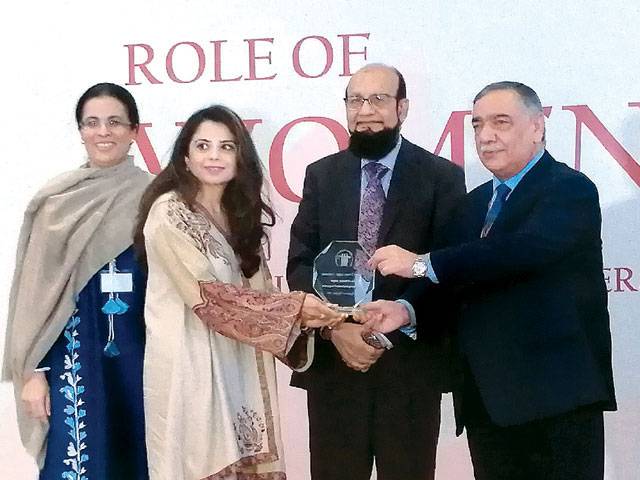LAHORE - Chief Justice of Pakistan Justice Asif Saeed Khosa on Sunday announced that the Supreme Court will soon have women judges.
Addressing the third and final session of ‘Women Judges Conference’ here, the CJP said that already 300 women judges were working in district courts. “I had an opportunity to propose two names and they are being actively considered,” he added.
CJP Khosa advised women judges to be very compassionate, kind and considerate ‘like mothers’ in a male-dominated environment.
The CJP said that it is judiciary’s responsibility to dispense justice to the people and women judges play equal role in this respect.
He lauded the performance of women judges deputed at district and high courts. He said that women judges had proven their abilities in the past through their decisions. He maintained that they had handled several complicated cases in the past.
He said there was a need for some relaxation on women’s bail.
The CJP urged women judges to remain active, confident and relaxed in their demeanour as the working environment affected women judges in the country. He added that some of them were passing solid judgments and trying to prove a point to their male counterparts.
He admitted that women judges had to take certain steps to survive in the male-dominated environment but all judgments should be passed as per the law.
He noted that the country’s courts had been working for protection of women’s rights for the past 50 years. He added that for the country’s prosperity it was essential to ensure that women were empowered in all walks of life.
Noting an issue which male judges do not experience in their profession, the CJP said, “… we have noticed that when they become judges, somehow because the whole atmosphere is male-dominated a ‘she judge’ also likes to behave like a ‘he judge’ so that she is taken seriously. This is one thing that we have noticed, that she does not even smile in the courtroom lest anyone else may get some impression.”
He maintained “Male judges don’t have that problem. They would cut jokes with the lawyers, they would relax the atmosphere and they would be comfortable with everybody else appearing in the court. But the female judge somehow has to change her personality. She has to become an iron lady so that nobody messes with her. So this is something that I wanted to discuss with you that just relax. Don’t become ‘he’ judge.”
Chief Justice Khosa said, “You (female judges) are compassionate, you are kind, you are considerate and when litigants will see you in court, they will feel that they can be in safe hands, very kind hands. The atmosphere has to be very relaxed in a courtroom so that the litigant feels comfortable and the lawyers also can come up with whatever they want to say in support of their clients I’ve seen women judges that have a very stern look so please relax, people will respect you, people will be very considerate towards you.”
He observed, “Just because you are women judges, you don’t have to impose yourself upon everybody and try to put on a show and to represent yourself as something which you’re not.”
He advised the judges, “Be women in the courtroom as well, be relaxed and be yourself. Don’t put on a show.”
Objecting to the title of the conference ‘Women Judges Conference’, the chief justice said that some other phrase should have been used for it and the distinction shouldn’t be based on gender. He said, “This is a contradiction in terms. We’ve been told that we have to change the vocabulary [...] you haven’t, please walk the talk. Act on what you tell us.”
He advised the female participants to shed the image of themselves as female judges. He said, “Just behave like judges, normal judges, and dispense justice according to law and then people themselves will stop noticing whether they are appearing before a woman or male judge. But at the same time, you have to be firm in the court. Don’t allow anybody to browbeat you, don’t allow anybody to undermine your authority. Be courteous but be firm.”
He maintained, “Now you’ll say I’m contradicting myself, I’m not. I’m not saying that just change yourself and relax but at the same time, firmness is something different.”
He noted, “You will find that for the last about 50 years, the courts have been trying to go an extra mile to take care of the areas where women were deprived of their rights.”
Talking about the example of inheritance in which the apex court had taken the step, he remarked that if someone was denied her inheritance even hundreds of years ago, she could still establish her rights today. He added, “The period of limitation will not be considered and she will be given her rights so that justice prevails.”
He said the Holy Quran time and again stresses a need for ensuring justice for all. “Allah loves those who are just.”
Stressing the need for coordination between bar and the bench, he said these were two wheels of the vehicle of judiciary, therefore, effective coordination between them was essential for dispensation of justice to the public.
He said it was absolutely essential to enforce law and maintain order for development of Pakistan.






